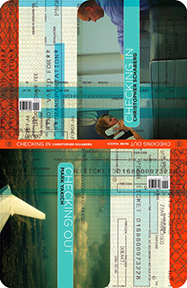He sat in the window seat, immersed in a magazine. I registered little about him other than he’d crossed his legs, he wore cuffed business slacks, and his thick hair was graying at the temples.
A second magazine, Time, lay on the empty seat between us. I don’t remember its cover, but I understood the moment I saw it that I was starved for news of the world. I was eighteen, on my way home for winter break after my first semester of college, a small liberal arts school in the Midwest circled by cornfields. I’d become deliciously immersed in the Eighteenth Century Romantic poets, but—in those years before the internet or TVs in every dorm room—I’d lost touch with the present.
So I turned to the gentleman and asked if I could borrow his extra magazine. I smiled. He smiled. Still, I didn’t really notice him—I was so attracted to that bright red cover.
Perhaps the gentleman thought my request a ruse to flirt with him. Or perhaps, seeing my face, open and looking not more than sixteen, he figured he could have a little fun. I had already disappeared into the first article, but he interrupted.
I didn’t want to talk. I was exhausted from my first finals. But I didn’t want to be unkind: my school emphasized character, and we talked often about being more unselfish, seeing the best in others, serving whomever we met.
Years later, after too many mistakes, I would realize that, with some men, eye contact and a smile can send an unintended message. So, actually, it was more kind to ignore them. But I didn’t know that then.
I put the magazine on my lap and turned to the man. He was, he told me, from Czechoslovakia. A plastic surgeon. On his way to an international conference in Vail. Did I want to see his nose jobs?
I did. I really did. My family collected amusing anecdotes, and his question was fabulously peculiar. And who doesn’t like before and after pictures? He took out an enormous three-ringed binder with page after page of photographs in plastic sleeves. Noses snipped, shortened, narrowed, remolded like putty. Unsmiling people with pale, greenish faces. Front shots. Profiles. He ordered another little bottle of alcohol. Did I want one, too? No. No, thank you.
My mind wandered toward the ethics of plastic surgery, how sad that already lovely women, with just the slightest bump on the top or ball on the end of their noses, were carving themselves up, destroying that very feature that gave them character. But then there were those very large or odd noses and the question became more complex.
But he had moved on to other topics. In Czechoslovakia, he had a wife. He had two children, a son and a daughter, whom he loved very much. “My daughter,” he said, “she is just about your age.” I nodded and smiled and listened.
Then, before I realized what he had done, he was in the seat next to me. I could smell the tang of his drink on his breath, his flowery aftershave. He pressed his shoulder into mine. I leaned as far as I could into the aisle. I glanced down the walkway to see if a flight attendant might pass anytime soon and help extricate me. One walked by and carefully edged her way around my body. Again, he crossed his legs and with his dangling foot began to caress my calf.
“You come with me,” he said in his heavy Czech accent. “I have a condo in Vail. You stay with me in my condo.”
My mind scrambled. He had a daughter my age. He had a wife. He had a bag full of noses! But I had not yet learned how to be rude. The challenge for a girl of that age and time—trained always to be polite—was to resist advances without hurting feelings.
I froze, then blurted: “I don’t think my mother would like that.” Perfect. I wasn’t rejecting him personally. At the same time, I was subtly reminding him of our ages and families.
Too subtly. He leaned more heavily into me and answered, “You tell your mother I’m a dok-tor. She won’t mind.”
Game over. He had crossed some line into ridiculousness. I laughed. I don’t remember what happened next, only that I was free of him and had tucked away a story to share.
The other day, I was exercising in the gym and caught a man glancing at me. He ran his fingers through his hair and I could see an elaborate tattoo ringing his left bicep. He moved to the machine next to me. In my peripheral vision I could see him trying to catch my eye, find the opening line. I was curious about him—his scruffy hair and weary face—and what was that tattoo?
But in the many years since that airplane ride, I have learned—most of the time, anyway—not to let curiosity or pathological politeness override my intuition. I’ve mastered the art of The Ignore. I looked ahead as if I hadn’t seen my tattooed man, counted my way through my repetitions, moved to the next machine.
Yet, even as I’m convinced The Ignore is the safer, the more ethical, route, I also know that in the trade, I’ve sacrificed something: satchels full of noses and new stories to tell.
Tarn Wilson has been published in Brevity, Gulf Stream, Inertia, A River and Sound Review, and The Sun, as well as the anthologies Hard Love, What’s Nature Got to Do with Me, and The Poet’s Guide to the Birds. New essays are forthcoming in Harvard Divinity Bulletin and Life Writing.






